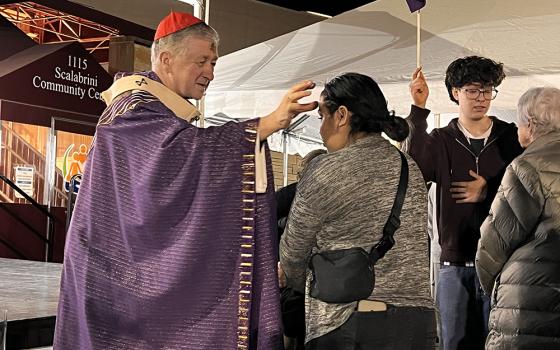Augustinian Sisters Regina, 86; Rita, 81; and Bernadette, 88, sit on a bench at their old convent in Goldenstein castle in Elsbethen, Austria, near Salzburg Sept. 12. They refuse to return to their retirement home. (OSV News/Reuters/Angelika Warmuth)
Three elderly women religious in Austria fled their nursing home and have returned to their longtime monastery, defying church superiors and highlighting the impact of Vatican regulations regarding aging members of dwindling religious congregations.
In what Austrian news outlet Kronen Zeitung has called a "monastery revolt," the three Augustinian sisters — Sister Bernadette, 88; Sister Regina, 86; and Sister Rita, 82 are for now being permitted to stay in Schloss Goldenstein, a former castle outside Salzburg that since the 18th century has been used by Benedictine and Augustinian religious orders. Since 1877, the site has housed a convent and private girls' school, with the latter now operating as a co-educational facility.
The sisters told Kronen Zeitung in August they had been sent to a care home against their will, and on Sept. 4 — with the help of a former student and a local locksmith — they returned to their quarters at the monastery. The convent had been placed under oversight due to Vatican regulations regarding shrinking communities of women religious.
"I have been obedient all my life, but it was too much," Sister Bernadette said, BBC News reported.
According to Kronen Zeitung, "at the behest of the Vatican," the sisters had transferred the convent in equal parts to the Archdiocese of Salzburg and to Reichersberg Abbey, assuming they would be allowed to live out the rest of their lives in their beloved home.
Instead, the sisters told the outlet, "We were shipped off."
The community was officially dissolved in 2024, and the remaining nuns were granted lifelong right of residence, as long as their health allowed, the BBC reported.
In 2018, the Vatican's Congregation (now Dicastery) for Institutes of Consecrated Life and Societies of Apostolic Life issued Cor Orans ("Praying Heart"), which implemented Pope Francis' 2016 apostolic constitution on women's contemplative life, Vultum Dei Quaerere.
Cor Orans requires a monastery or contemplative community of women religious to have at least eight professed religious women in order to maintain their autonomy. If that number drops to five professed religious, they lose their right to elect a superior, the Vatican congregation is informed of the situation, and an ad hoc commission is formed to name an administrator.
"Legally, when religious orders become too small or their members reach a very advanced age, the Vatican's Ministry (Dicastery) for Orders appoints a superior — either from within the order's own family or from another community," Sr. Christine Rod, secretary general of the Austrian Conference of Religious Orders, said in a statement.
The Goldenstein sisters had been placed under the authority of "the President of the Federation of the Augustinian Choir Sisters in Germany and Provost Markus Grasl, who was appointed superior by the Vatican," she said. "The Reichersberg Abbey, which he leads, adheres to the same Augustinian spirituality as the Goldenstein Augustinian Choir Sisters."
On "a human-emotional level," Rod said, "it's about age-appropriate care — similar to any family — and also about providing the best possible support to the sisters during a very challenging phase of their lives."
A view of Goldenstein castle near Salzburg, where three elderly Augustinian Sisters returned (OSV News/Reuters/Angelika Warmuth)
In a statement dated Aug. 18, Provost Markus Grasl of Reichersberg Abbey, the sisters' superior, defended relocating the women in December 2023 to the Kahlsperg Castle senior home, saying the decision "was made for the well-being of the sisters and out of concern for them.
"Due to the sisters' advanced age and precarious health, as well as the spiritual needs of the order and the structural condition of the monastery, independent living at Goldenstein Monastery was no longer possible or justifiable," Grasl said. "This step was necessary to ensure care, support, and protection from possible neglect and abuse by third parties."
He added, "In all decisions, I was in close consultation with the sisters themselves, with the Episcopal Vicar for Orders of the Archdiocese of Salzburg, and with the President of the Augustinian Choir Sisters in Essen (Germany)."
The Kahlsperg care center "isn't just any home, but a facility run by the Hallein Franciscan Sisters," Rod said in her statement. "This ensures that the sisters not only receive professional care and support, but can also continue their religious and spiritual life."
Many "religious who have achieved so much over decades are now old and few in number, living in homes that are not appropriately equipped for their age," Rod said, noting that church officials "face the challenge of providing responsible retirement provision for religious women and men."
She said that "independent living at Goldenstein Monastery was no longer possible" due to the sisters' "advanced age and state of health," and asserted that "the original building had become too large for the remaining members of the order" and was "no longer sufficient for practical needs."
Advertisement
The sisters have told the media that care is best offered in their longtime home.
The initial lack of water and electricity at their convent didn't dampen their joy upon returning. Services have been partially restored, doctors are providing medical care, and former students and other supporters are pitching in to help them with meals and fellowship.
One former student, Sophie Tauscher, told BBC News, "Goldenstein without the nuns is just not possible."
She added, "When they need us, they just have to call us and we will be there for sure. The nuns here changed so many lives in such a good way."




